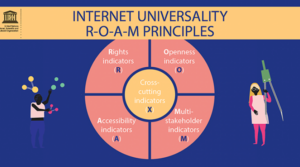Over three years, UNESCO has developed a framework of Internet Universality ROAM-X Indicators, using a global, open, inclusive and multistakeholder process that tapped the world’s wisdom. The result is a research instrument that contains 303 indicators (109 identified as core ones). These cover the categories of R.O.A.M (Rights, Openness, Accessibility, Multi-stakeholder) Â as well as 79 contextual and cross-cutting indicators to address gender equality and the needs of children and young people, economic dimensions, trust, and security, as well as legal and ethical aspects of the Internet. This unique and powerful resource was welcomed by the UNESCO Member States in UNESCO’s International Programme for the Development of Communication (IPDC) in November 2018. The UNESCO IPDC Council has taken the decision to endorse the voluntary application of the ROAM-X indicators by stakeholders interested in conducting national assessments of Internet development.
The Kenya ICT Action Network (KICTANet) in collaboration with UNESCO undertook a project to conduct a national assessment of Kenya using the ROAM-X indicators framework. The framework is a unique and powerful resource which has been developed through an extensive process of research, consultation and analysis. The Kenya national assessments measured all the six categories of indicators, but with a focus on the 109 core indicators.
The national assessment process led to the formulation of a national assessment report and organized related events which aimed to:
- Present a comprehensive and substantive understanding of the national Internet environment and policies;
- Assess alignment of the environment and policies to UNESCO’s R.O.A.M. principles and their contribution to sustainable development;
- Develop policy recommendations and practical initiatives that will enable the country to improve its Internet ecosystem as advanced ICTs evolve.
Since the inception of the project, KICTANet has already developed a draft national assessment report on the internet universality indicators (IUI) which assessed the national internet environment evaluating policies that align to UNESCO’s ROAM principles. The report was developed by a team of researchers and influenced greatly by input from a Multi-stakeholder Advisory Board (MAB) with expertise in the internet sector in Kenya.
On the 28th of February 2020, a national validation meeting was convened by KICTAnet in partnership with UNESCO where stakeholders that represent Government, Civil Society, Technical Community Legal fraternity, Academia, Media and Internet Users who then gave expert insight and input to the drafted national assessment report to ensure Kenya’s internet environment is represented exhaustively and comprehensively.
Following the National Validation meeting , the National Assessment report was finalised inclusive of the feedback from the national validation meeting and presented to UNESCO in March 31st 2020 making Kenya the 1st country in Africa and the 2nd globally after Brazil to have a developed an internet universality indicators framework.
The research output can be found on the UNESCO website and the KICTANet website with the ISBN 978-92-3-100408-7.

